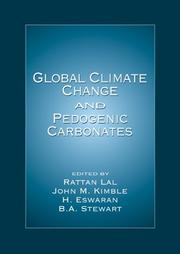| Listing 1 - 10 of 21 | << page >> |
Sort by
|
Book
ISBN: 0444639500 9780444638656 0444638652 9780444638656 9780444639509 9780444639509 Year: 2018 Publisher: Amsterdam, Netherlands : Elsevier,
Abstract | Keywords | Export | Availability | Bookmark
 Loading...
Loading...Choose an application
- Reference Manager
- EndNote
- RefWorks (Direct export to RefWorks)
Climate Change Impacts on Soil Processes and Ecosystem Properties, Volume 35, presents current and emerging soil science research in the areas of soil processes and climate change, while also evaluating future research needs. The book combines the five areas of soil science (microbiology, physics, fertility, pedology and chemistry) to give a comprehensive assessment. This integration of topics is rarely done in a single publication due to the disciplinary nature of the soil science areas. Users will find it to be a comprehensive resource on the topic.
Book
Year: 1968 Publisher: London : University Tutorial press,
Abstract | Keywords | Export | Availability | Bookmark
 Loading...
Loading...Choose an application
- Reference Manager
- EndNote
- RefWorks (Direct export to RefWorks)

ISBN: 1566704588 Year: 1999 Publisher: Boca Raton (Fla.) : Lewis,
Abstract | Keywords | Export | Availability | Bookmark
 Loading...
Loading...Choose an application
- Reference Manager
- EndNote
- RefWorks (Direct export to RefWorks)
Climatic changes. --- Soils and climate. --- Soils --- Carbonate content.
Book
Year: 1987 Publisher: [Reston, Va.] : Washington : Department of the Interior, U.S. Geological Survey, United States Government Printing Office.
Abstract | Keywords | Export | Availability | Bookmark
 Loading...
Loading...Choose an application
- Reference Manager
- EndNote
- RefWorks (Direct export to RefWorks)
Geology --- Soil chronosequences --- Soil formation --- Soils and climate --- Soils
Book
ISBN: 3540583734 0387583734 3642792200 3642792189 Year: 1994 Volume: 23 Publisher: Berlin Springer
Abstract | Keywords | Export | Availability | Bookmark
 Loading...
Loading...Choose an application
- Reference Manager
- EndNote
- RefWorks (Direct export to RefWorks)
Meteorology. Climatology --- Pedology --- Climatic changes --- Soil ecology --- Soils and climate --- Congresses. --- Congresses
Book
Year: 1960 Publisher: New Delhi, : Indian Council of Agricultural Research,
Abstract | Keywords | Export | Availability | Bookmark
 Loading...
Loading...Choose an application
- Reference Manager
- EndNote
- RefWorks (Direct export to RefWorks)
Multi
ISBN: 9783031210792 9783031210785 9783031210808 9783031210815 Year: 2023 Publisher: Cham Springer International Publishing
Abstract | Keywords | Export | Availability | Bookmark
 Loading...
Loading...Choose an application
- Reference Manager
- EndNote
- RefWorks (Direct export to RefWorks)
The book provides an overview relevant to various biological mechanisms that regulate carbon exchanges between the major components and their response to climate change. Climate change has a significant impact on people's lives, energy demand, food security, etc. The soil microbial ecology is vital for assessing terrestrial and aquatic carbon cycles and climate feedback. However, the primary concern is the complexity of the soil microbial community and its severely affected functions due to the climate and other global changes. Global warming comprises an assessment of the dynamic interactions and feedback between microbes, plants, and their physical environment due to climate change. The book will address the need to use a multifactor experimental approach to understand how soil microorganisms and their activities adapt to climate change and the implications of carbon cycle feedback. The most pressing concern is a clearer understanding of the biological factors that regulate carbon exchanges between land, oceans, and the atmosphere and how these exchanges will respond to climate change via climate-ecosystem feedbacks, which could augment or quell regional and global climate change. Terrestrial ecosystems play an important role in climate feedback as they produce and absorb greenhouse gases like carbon dioxide, methane, and nitrous oxides. They also strongly contribute to storing enormous amounts of carbon in living vegetation and soils, rendering them a significant global carbon sink. If climate change projections are realistic, such a rapid increase in carbon loss from soil could exacerbate the soil carbon cycle feedback. The book will determine the role of microbial feedback in regulating soil-land-atmosphere carbon exchange under changing climatic conditions at the regional and global levels. The current book will also focus on recent research designed to use beneficial microbes such as plant growth-promoting microorganisms, fungi, endophytic microbes, and others to improve understanding of the interaction and their potential role in promoting advanced management for sustainable agricultural solutions. Understanding the influence on the native microbiome, such as the distribution of methanogens and methanotrophs, nutritional content, microbial biomass, and other factors, is becoming increasingly crucial to establishing climate-resilient agriculture. .
Meteorology. Climatology --- General ecology and biosociology --- ecologie --- klimatologie --- klimaatverandering --- Climatic changes. --- Soil microbiology. --- Soils and climate.
Year: 2009 Publisher: [Washington, D.C.] : United States Department of Agriculture, Agricultural Research Service,
Abstract | Keywords | Export | Availability | Bookmark
 Loading...
Loading...Choose an application
- Reference Manager
- EndNote
- RefWorks (Direct export to RefWorks)
Climatic changes --- Soils and climate --- Air quality management --- Greenhouse gas mitigation --- Sustainable agriculture
Periodical
Year: 2010 Publisher: [Washington, D.C.] : [United States Department of Agriculture, Agricultural Research Service],
Abstract | Keywords | Export | Availability | Bookmark
 Loading...
Loading...Choose an application
- Reference Manager
- EndNote
- RefWorks (Direct export to RefWorks)
Book
Year: 2019 Publisher: Washington : U.S. Government Publishing Office,
Abstract | Keywords | Export | Availability | Bookmark
 Loading...
Loading...Choose an application
- Reference Manager
- EndNote
- RefWorks (Direct export to RefWorks)
Agriculture --- Climate change mitigation --- Farmers --- Crops and soils --- Soils and climate --- Crops and climate --- Crops --- Climatic changes --- Research --- Management. --- Genetic engineering --- Forecasting.
| Listing 1 - 10 of 21 | << page >> |
Sort by
|

 Search
Search Feedback
Feedback About UniCat
About UniCat  Help
Help News
News